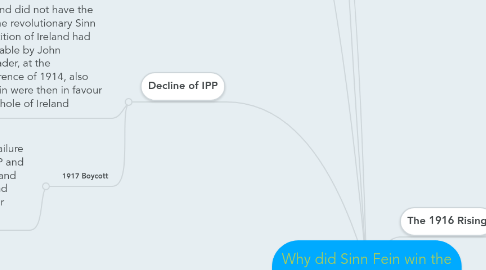Why did Sinn Fein win the 1918 General Election
da Caitlin Seeley


1. British reaction to 1916
1.1. The British governments reaction to 1916 changed public opinion.The implementation of Marshall Law under General Maxwell made people more sympathetic to the Rebels, and bitter to the British. The inhumane killngs of the rebels, internment of many innocent civillians increased anti-British feeling in Ireland
2. The Conscription Crisis
2.1. In 1918, Lloyd George attempted to introduce conscription in Ireland. This was heavily opposed by all parties and the Church. Eamonn de Valera, now Sinn Fein leader, signed and started a petition against conscription which was signed by two million people.
2.2. In this way, Sinn Fein gained the credit when the government backed down
3. Representation of the People Act 1918
3.1. the electorate was expanded to all males over 21 and all females over 30. The created a swathe of new, young voters, radicalised by events since 1916, all enthused by the vibrant leadership of Sinn Fein. Eamonn de Valera, Michael Collins, Cathal Brugha et al, as opposed to the staid IPP.
3.2. Sinn Fein was an exciting party promising change and abstention, which meant an all Ireland Parliament.
4. Decline of IPP
4.1. The Irish Parliamentary Party was by now seen as a staid, conservative party and very firmly associated with the House of Commons, which had failed to deliver Home Rule. The IPP was led by John Dillon, aged 70, and did not have the glamour associated with the revolutionary Sinn Fein. The fact that the partition of Ireland had been accepted as unavoidable by John Redmond, the previous leader, at the Buckingham Palace Conference of 1914, also lost them support. Sinn Fein were then in favour of independence for the whole of Ireland
4.2. 1917 Boycott
4.2.1. This conference ended in failure with no agreement reached. It was a very public failure and it reinforced the association of the IPP and failure. The fact that Sinn Fein boycotted and so were not associated with the failure, and could in fact criticise the IPP, meant further boosts to Sinn Fein’s popularity
